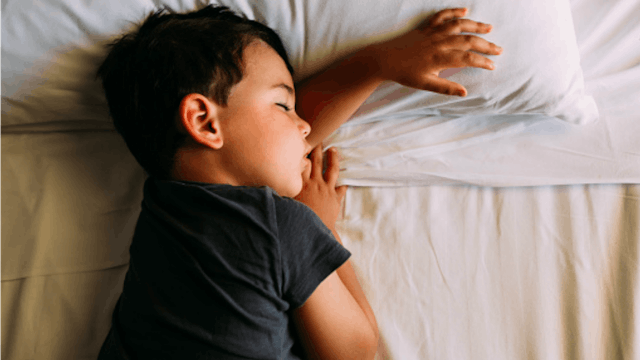One Thing I Get Right: Sticking To A Consistent Bedtime For My Kids

By the time bedtimes roll around in my house, I am spent. Let me clarify: by the time I need to do my kids’ bedtime routines, I am spent. No matter how good the day was, bedtime can be hell. This is in part because it always comes about an hour to 90 minutes after dinner, and dinner uses up any bit of patience or goodwill I have left in the tank. I am all set with poop jokes, bickering, backtalk, and requests for snacks.
But another reason the bedtime routine can be a nightmare is because I am very strict about it. I refuse to leave much wiggle room for changes to our bedtime patterns because I know how important their sleep is for all of us. While I don’t love the nagging and procrastination that starts every night in our house at 7:30 p.m., the benefits of sleep are worth the fight.
My oldest child is 8 and her twin siblings are almost 6. The twins have always been on the same sleep schedule, and, for the last few years, they go to bed at the same time each night. A 2013 study published in Pediatrics proved that consistent sleep habits improve a child’s behavior. More specifically, the study of 10,000 kids providing data at ages 3, 5, and 7 showed that nonregular bedtimes cause “behavioral difficulties.”
Teachers and mothers were asked to rate their children’s behavior, and the data proved that, “There was an incremental worsening in behavioral scores as exposure through early childhood to not having regular bedtimes increased.”
This makes complete sense to me. When my kids are tired or didn’t get a good night’s sleep the night before, they are insufferable. They can’t focus on what they need to do. They have even bigger and more sensitive emotions than usual. They are more combative with their siblings, and they are more likely to respond irrationally to discipline. When my kids’ bedtime routine is messed with because of vacations or sickness, they seem to lose all control of self during critical moments of the day.
Another study published in Frontiers in Human Neuroscience explained the reason for this poor behavior is because sleep deprivation affects more parts of a child’s brain than seen in adults. To prove this, the study measured the brain activity in 5- to 12-year-olds with both a full night’s sleep and then half that. When we are tired, we are cloudy and our memory suffers—these are prefrontal side-effects. But when children’s sleep patterns were negatively impacted, the parieto-occipital areas and myelin content were negatively affected too. These are the rear and fatty portions of the brain and are responsible for messages moving quickly and smoothly through the brain.
The last thing my tired kid can do is think smoothly. For this reason, I do not allow my kids to have sleepovers at other people’s homes unless I am guaranteed the other parents are as strict about bedtimes as I am. The last time my daughter slept at a neighbor’s house resulted in the next day being a complete shitshow. She was mean. She could not make decisions. And she was sure the world was against her and often burst into tears as if to prove her point. She finally passed out later in the afternoon but then could not fall to sleep until close to 11:00 p.m. that night. It took several days for her to get back into rhythm.
And that’s the other thing that the Pediatrics study showed: If a regular bedtime schedule is set for a child and they are getting the sleep they need, their behavior improves.
Sleep is so, so crucial to our kids’ brains. Not only does it keep their behavior in check, but it helps their immune system, their ability to learn and focus, and it reduces their risk of obesity. And if your kids are sleeping, you have a better chance of getting more sleep too. I am guilty of staying up too late to get work done, and after a few days of late nights my mood changes, my focus fails, and I start to spiral. I know I need to do a better job when it comes to racking up the hours I am asleep. But at least with a set routine for my kids, I have the opportunity to find my bed more often.
As much of a pain in the ass it is to get my kids moving towards sleep, a routine really does help. While they don’t love to brush their teeth, get their pajamas on, and pick out clothes for the next day, they know the expectations and they eventually fulfill them. We then read a set number of stories and turn out the lights. Screen time is limited before bed as well as rough play—though just getting them up the stairs on most nights results in sibling body slams and bedroom pillow fights. My kids also have sound machines in their rooms and my oldest takes a very low dose melatonin gummy that helps her fall asleep; half a gram of melatonin allows her to peacefully fall asleep after I read to her instead of lying in bed for an hour with noisy thoughts or staying up way too late reading on her own.
My kids have missed some evening events because of the strict bedtime routine in our house, but staying too long at a friend’s party or seeing an evening sporting event or movie are just not worth the shitty behavior that follows the next day.
This article was originally published on